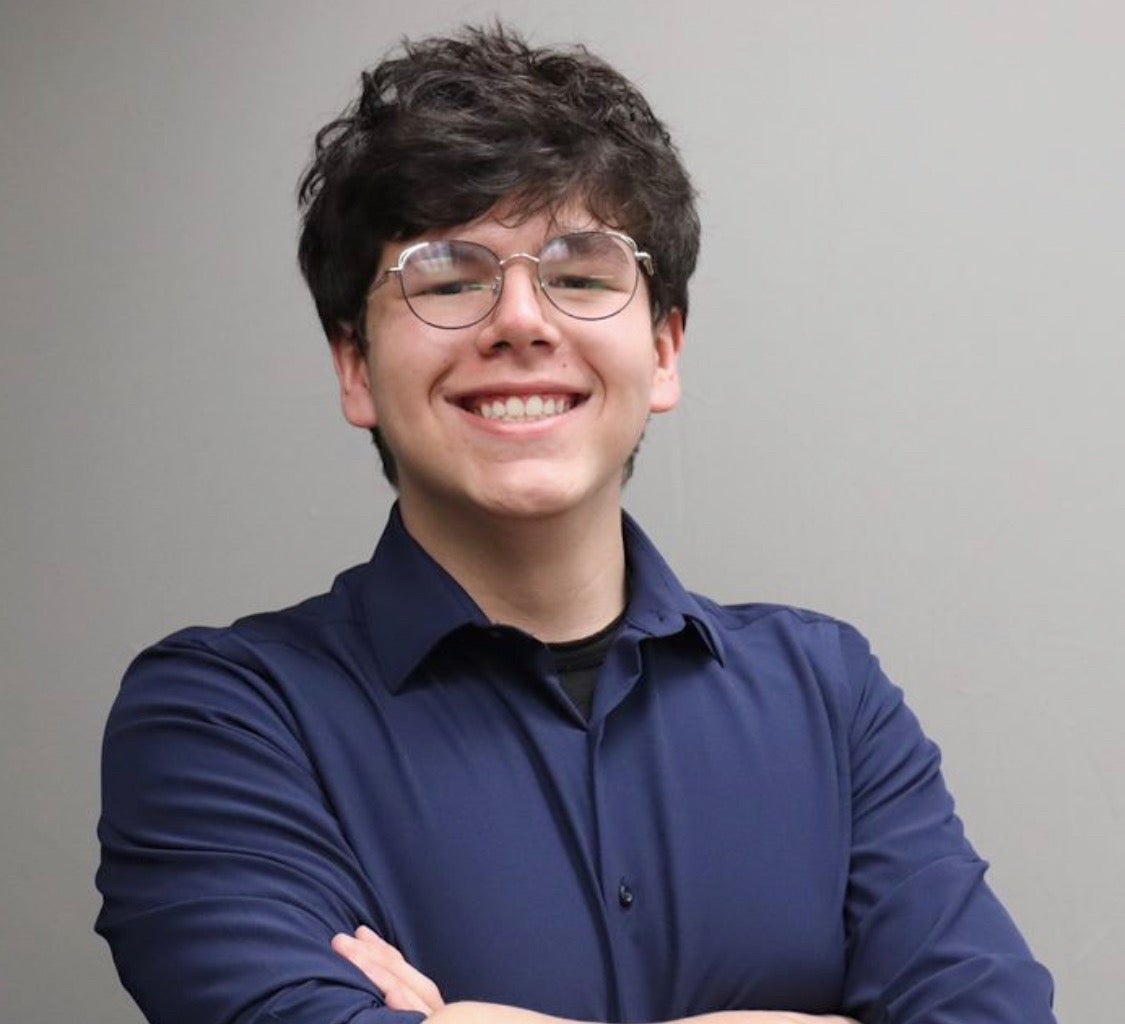
Tuesday, August 15
Working with computers has been a constant in César Guerra-Solano’s life.
“I grew up surrounded by computers,” Guerra-Solano said. “My dad is a data scientist and used to be a university professor in computer science."
Before arriving at the University of Pittsburgh School of Computing and Information (SCI) in 2022, Guerra-Solano had already pursued many projects related to computing. When he was in grade school, he used programming languages like Snap! and Scratch to build games. During his first year of high school, he taught himself how to program in Python and began learning some of the basics of data science.
He has also had an interest in sharing his knowledge with others. Whether teaching fellow students how to program in his high school’s Hack Club or leading his school’s robotics team, Guerra-Solano said he has always been looking for ways to use computers to educate others, as well as discover new knowledge. Having completed his first year at SCI, Guerra-Solano said his intention is to declare a Computer Science and Computational Biology double major.
This summer, Guerra-Solano is a 2023 Center for Military Medicine Research (CMMR) Summer Scholar. Summer Scholars are given funding to complete team-based medical and biological research through the Comprehensive Student Research Training Program at the Uniformed Service University for the Health Sciences (USUHS) in Bethesda, MD. In addition to scholarship support, participants are also provided with a research stipend for the duration of the program.
Guerra-Solano said that he has spent most of his time at USUHS developing a Python pipeline for machine learning “to be used with clinical decision support tools on the field by the military, as well as other purposes.” Clinical decision support tools provide information to clinicians to help them better assess and treat patients. He said that he and his colleagues were working to make the pipeline “adaptable to a bunch of different situations and datasets.”
“If they need to process or predict fungal infection data, or if they want to do rib fracture or skin graft data, it could be used for that,” Guerra-Solano said. “That’s what I’ve been working on specifically, adapting a specific R pipeline they have for Python, since that’s suited for cloud computing.”
Guerra-Solano is working to make the pipeline support continuous and multiclass data, which will enable it to be used with a greater variety of datasets.
While he has traveled to Bethesda for the internship, much of the work Guerra-Solano is doing as a CMMR Summer Scholar consists of programming and data analysis. As a result, he has been able to accomplish most of that work remotely. He said that on an average day, he wakes up and begins working on the objectives that have been set during weekly meetings with his advisor, Dr. Renhua Li of the USUHS Surgical Critical Care Initiative. He also said that he and Li email constantly throughout the day, maintaining lines of communication as important project deadlines approach.
“Right now, towards the end of the internship, things have gotten pretty hectic,” Guerra-Solano said. “As I progress through work and get results, I will immediately email and ask if this is what they’re looking for or whatever other things I should pursue. I work through things. We’ll meet intermittently throughout the day. I’ll have a meeting in the morning pretty much every day, and a team meeting once a week, and I communicate things independently as much as I can.”
In addition to providing support for ongoing research efforts at USUHS, fellowship awardees also participate in professional development activities, such as Journal Club. In this club, students are given the opportunity to practice reading a piece of peer-reviewed scientific research and then present it to “PhDs, interns, and other faculty at USUHS.” He said that this exercise has been valuable, helping him gain experience with skills that he will be important later in his career.
Guerra-Solano hopes to follow in his father’s footsteps.
“Long-term, I’d like to be a professor and go into academia,” Guerra-Solano said “Getting a PhD has always been a definite for me. Being able to teach is the coolest thing to me. I’ve always wanted to do research and get experience writing papers.”
His CMMR experience has been great for helping him prepare to use those skills and more.
“Making research posters has also been absolutely invaluable because I haven’t been able to practice those skills enough, as well as stuff like writing a paper,” Guerra-Solano said.
When it comes to finding exciting academic opportunities like the CMMR Summer Scholar Fellowship, Guerra-Solano says that the best advice he can give is “just ask.”
“I wouldn’t have even known about this if I had not started asking [people] within SCI about pursuing opportunities as a [first-year student],” Guerra-Solano said. “It’s not stuff that’s readily advertised and people appreciate an eagerness to pursue more, so reaching out and asking seems to work. People talk about cold emailing for getting into a lab … it works. Making those kinds of connections and letting them know that you’re passionate about learning and ready to do that work and become a good contributing member of the lab through that learning experience in the beginning is really important.”
--Daniel Beresheim
